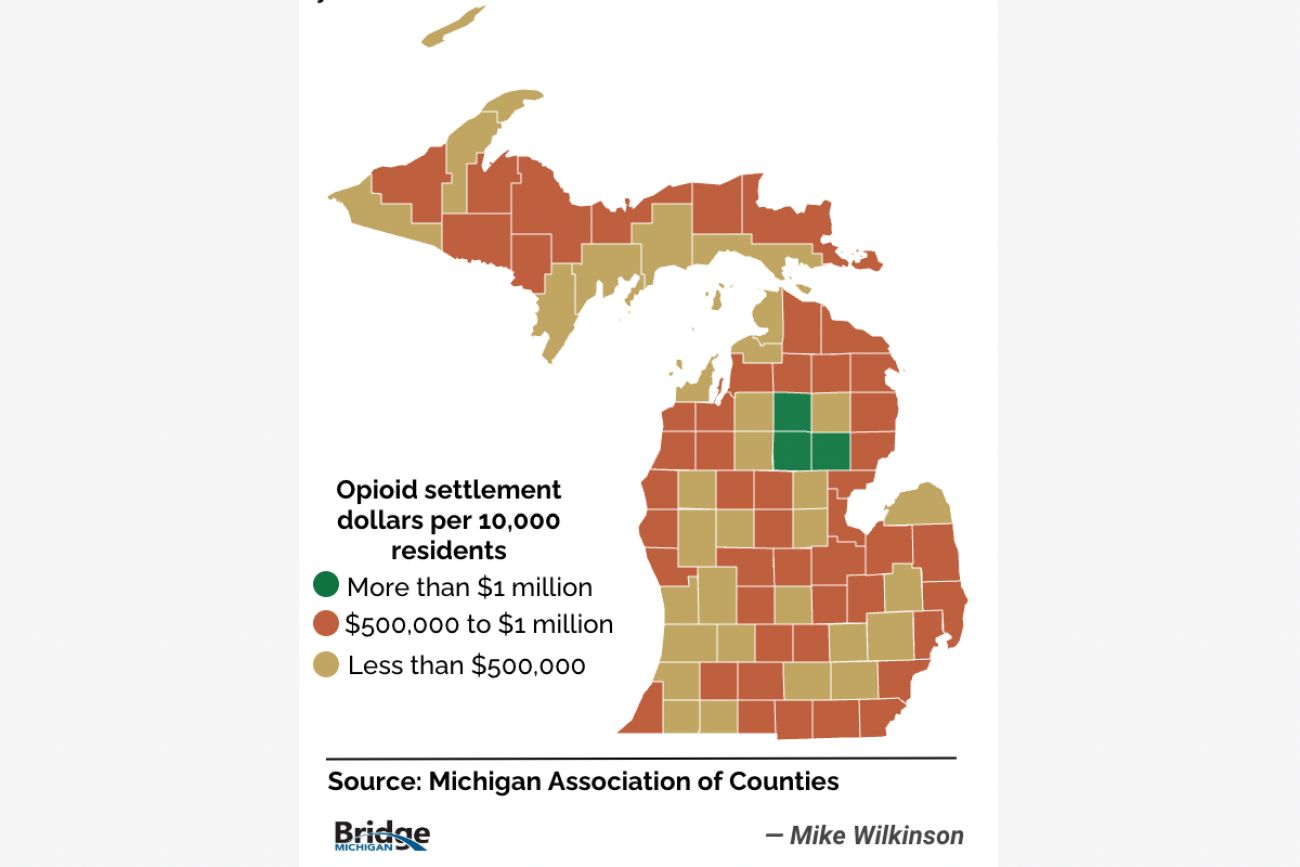See how much your Michigan community will get in opioid settlement funds


- Michigan communities are splitting about $725 million in opioid settlement funds over 18 years
- Communities considered to have been harder hit by the opioid crisis are getting more per capita
- Communities began receiving funds in early 2023
Michigan counties, townships and cities will split about $725 million in opioid settlement funds over 18 years, with communities harder hit by the opioid crisis receiving more money per capita.
The Michigan funds are part of a national settlement of numerous lawsuits against manufacturers, distributors and pharmacies that were accused of downplaying the risks and ignoring the perils of prescription painkillers, fueling today’s opioid crisis.
Overall, Michigan will get about $1.5 billion, with slightly more than half going to the state and the rest to local jurisdictions.
Related:
- Michigan disbands racial equity group as tension mounts over opioid money
- In Michigan, naloxone has reversed over 6,600 overdoses since 2020
- Michigan unveils spending on $1.5B opioid settlement, amid secrecy fears
Total settlement funds over 18 years to local governments range from almost $70 million coming to Wayne County to $173 to Union Charter Township in Isabella County.
“When I saw the amount, I figured it wasn’t worth the taxpayers’ time to fill in the paperwork” to get the funds, said Kelly VanMarter, manager in Genoa Township in Livingston County, which was set to receive $240 over 18 years.
Money that isn’t claimed by townships or cities are sent to the counties in which they are located.
Other large cities and counties in line for the settlement include Macomb County ($53 million) Oakland County ($35 million), Detroit ($43 million), Flint ($17 million) and Kent County ($18 million).
Communities are receiving different amounts per capita, depending on a formula the state developed to measure vulnerability to the crisis.
For example. Ogemaw County, in rural northeastern Michigan, will receive almost nine times more per capita ($1.8 million per 10,000 residents) than Ottawa County, near Grand Rapids ($208,000 per 10,000 residents.)
Michigan’s Substance Use Vulnerability Index takes into account factors such as fatal and nonfatal overdose rates, opioid prescription rates, drug arrests and distance to treatment centers.
About these stories
Michigan is set to receive $1.5 billion from a national settlement with opioid manufacturers and distributors. Bridge Michigan interviewed more than four dozen experts, community leaders and researchers. Many expressed worries that Michigan has not set up enough oversight of how the money is being spent.
As opioid deaths mount, Michigan governments sit on millions for intervention
Michigan won’t know how $725M is spent on opioid help. Other states do it better
Michigan opioid cash sparks feeding frenzy of vendors, seeking cut of $1.5B
Has the opioid crisis hit your family? We seek Michigan stories
Michigan county ‘hit ground running’ with opioid plan. Then came the complaints
Bridge Lunch Break
On Feb. 28, Bridge reporters and experts will discuss the drug crisis and how Michigan governments are spending the $1.5 billion coming the state’s way. Learn how to sign up here.
Get help
For help with opioid abuse, call the SAMSHA National Hotline, a 24-hour, 365-day-a-year, treatment referral hotline. 1-800-662-HELP (4357)
See what new members are saying about why they donated to Bridge Michigan:
- “In order for this information to be accurate and unbiased it must be underwritten by its readers, not by special interests.” - Larry S.
- “Not many other media sources report on the topics Bridge does.” - Susan B.
- “Your journalism is outstanding and rare these days.” - Mark S.
If you want to ensure the future of nonpartisan, nonprofit Michigan journalism, please become a member today. You, too, will be asked why you donated and maybe we'll feature your quote next time!



